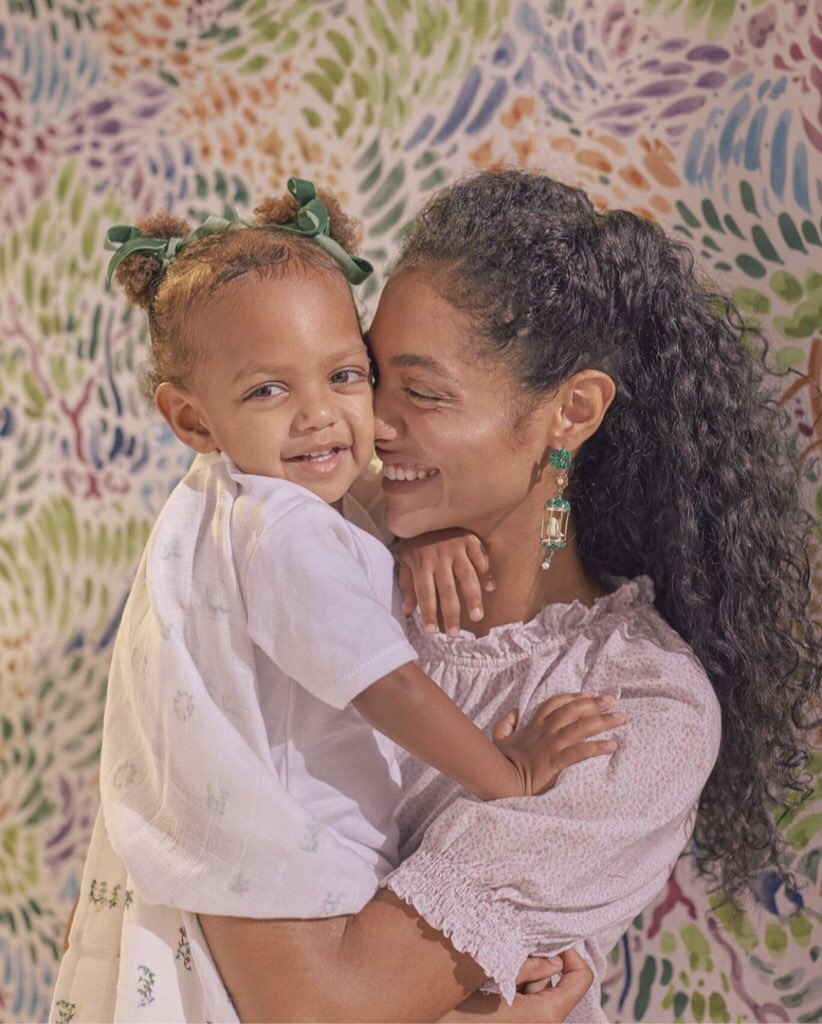Jaycina Almond was 21 when she gave birth to her daughter Syx. At that time, the Atlanta-based model remembers being heavily discouraged from disclosing her motherhood by agents who feared it would stall her career. “They would tell girls that being a mom would hurt your brand, especially if you were young,” she shared. Almond was young, Black, and going to be a single parent. Yet what agents predicted would be her downfall turned out quite differently.
A lot has changed in the industry since Syx’s birth. Stretch marks are cool, no longer seen as flaws to be photoshopped out. Slick Woods will forever go down in catwalk history for strutting the Savage x Fenty fashion show while in labour, giving birth to her son Saphir the following evening. Yanii Gough has modelled alongside partner George Okeny and son Zola for stunning campaigns including one for Burberry’s Monogram collection and most recently a Ralph Lauren holiday special. Gradually, fashion is shifting its perspective, seeking to represent womanhood in all its possible facets, motherhood included.
Now 24, with three years of experience under her belt, Almond knows first-hand how the industry has adapted. When she arrived on set for the Gap Holiday 2018 campaign, which also featured model Sabina Karlsson and her son, she was greeted with baby wranglers and a specialised schedule. “When you’re on set with your kid, you’re not having a full day’s work, two hours and you’re gone. Even when I was working and my daughter wasn’t with me, I would still have to pump because I was nursing; producers would schedule in that time so I could get a break to do that.” Fellow model mama Mason, who shared a behind-the-scenes shot of her breastfeeding on set of ThirdLove’s “To Each, Her Own” campaign, echoed it not being as hard to keep her career now that she is a mother, sharing that for many of the jobs she gets, her daughter is also booked.

But Jaycina knows that many mothers do not receive the care and support they need to ensure the livelihood of both their families and themselves. In Georgia, the average cost of infant care is roughly the same as tuition for a four-year college degree. Faced with the reality of expensive centres and needing to have enough money left over for food and diapers, many are forced to cut back on hours and left scraping by.
Historically, marginalised communities are hit hardest. The alarming lack of adequate prenatal care mothers face sheds light on this. According to a Center For Disease Control report released this fall, Black and Indigenous women are three times more likely to die from preventable pregnancy complications than white women.
Aware of the implicit racism and disparities in wealth, education, and medical support that limit a mother’s ability to protect not only their baby but their personal health, Almond knew she had to do something. And so, Tender was born.
Launching next month, Tender will provide the short-term emergency assistance these mothers struggle to access. Rent and bills will be paid for directly by the non-profit, using crowdsourced donations and Jaycina’s personal funds, and grocery delivery alongside store gift cards will be used to tackle hunger.
Tender will also provide ongoing guidance to mothers, helping them navigate the process of getting extended assistance for as long as they need through their regional partners. Their stabilisation plan will connect mothers with Families First, an organisation that offers a wide range of family services including a pregnancy and early parenting program, and Our House Georgia which provides shelter and education for families experiencing homelessness.

“The goal is to get these families stabilised, to get them out of survival mode. By partnering with local non-profits we’ll then be able to provide them with long-term resources. So that way, we can not only give them some assistance to get back on their feet and get out of a crisis, we can also get them in touch with resources that can put them on track to self-sufficiency,” says Jaycina.
If you’re struggling to make ends meet, it is hard to block out several hours for an appointment in the hopes of getting future assistance when every hour could be spent trying to earn money that will come in a guaranteed paycheque. Often, mothers need the money immediately.
By providing instant funds to these mothers, Tender hopes to give them another option — one that affords them more time to make arrangements and doesn’t require missed wages and the fear of being penalised at work.
“I can search for assistance in Atlanta right now, and there are a bunch of options, but there are so many barriers to receiving the help,” explains Jaycina. “With a lot of places you have to call and you have to have an on-boarding meeting where you sit down with a caseworker and you have to go over every single thing. And I feel like the process turns so many people away, because there’s this stigma and shame that comes along with it.”
As a result, many feel as if they are foolishly pushing themselves to the limit to achieve in a system that was set up for them to fail. Looking at the history of medicine alone shows how little regard there has been for women and their bodies: from Henrietta Lacks, who unknowingly had her cells extracted and cultured without consent or compensation in 1951, to Serena Williams, who had to pressure her doctors for a postnatal CT scan that would end up saving her life. “I’m a young, Black, single mother. So for me, it’s really important that I use my platform to make an impact on other women’s lives,” says Jaycina.

Working towards a goal of $20,000 in donations in the first year, Jaycina is determined to help as many mothers as she can overcome their hardships so that they can dedicate more of their energy to experiencing the joys of motherhood. Down the road, she’d like to build out Tender, so that she can provide low-cost childcare and employment opportunities. Once Atlanta is running, she’ll then set her sights on NYC and LA, cities she travels to frequently for work.
If there’s one thing Jaycina doesn’t want mothers to feel when they come to Tender, it’s that they are asking for a handout. “I want it to feel comforting, like love and care,” she says. “I want mothers to feel dignified and empowered.”
